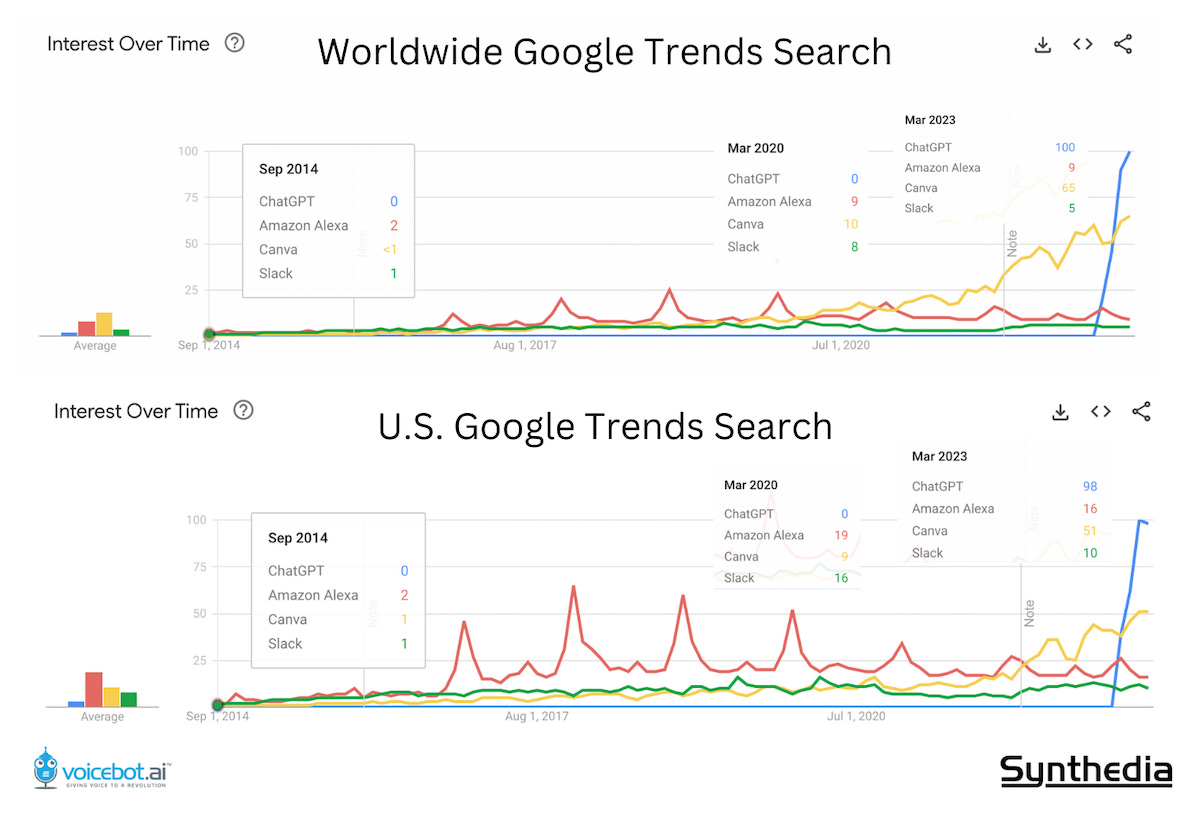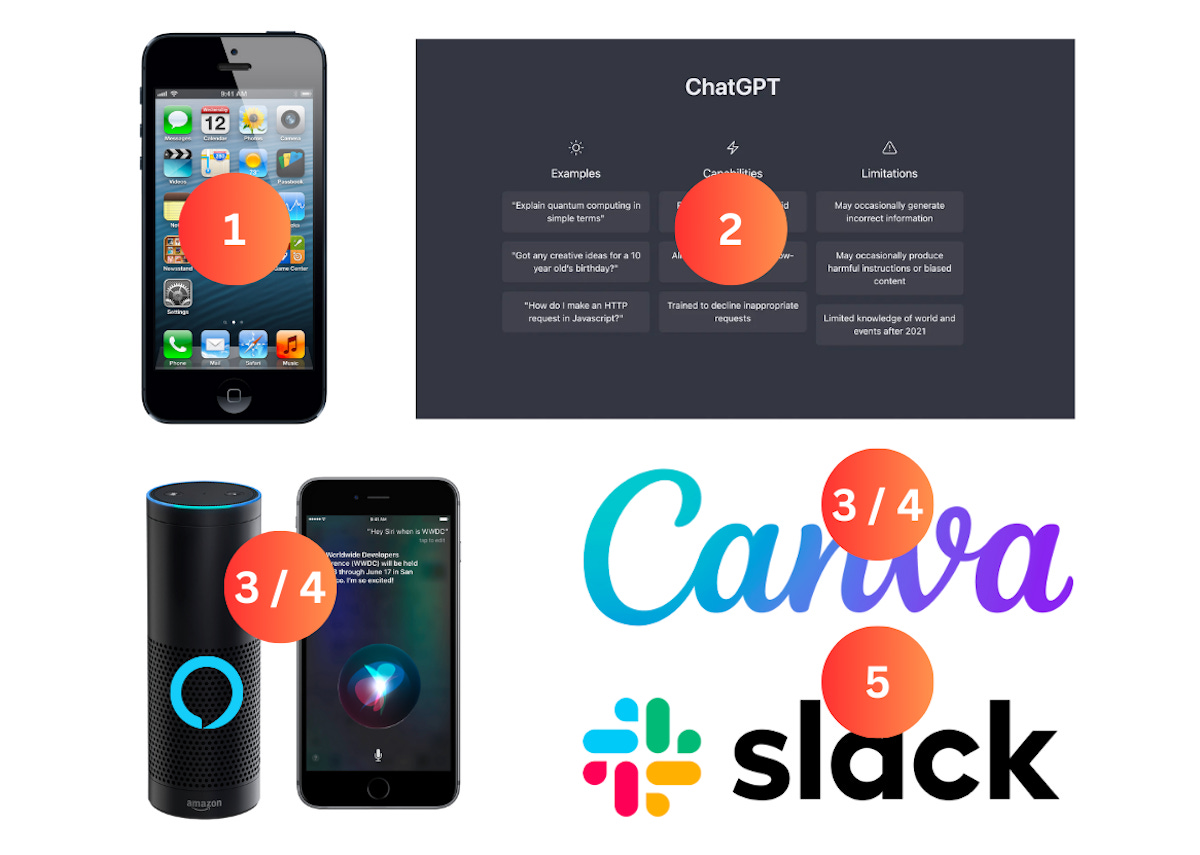How Popular is ChatGPT Compared to Alexa and the iPhone? A Look at the Data.
Trends from the iPhone and Alexa to Canva and Slack
ChatGPT is a phenomenon dominating tech press headlines and spilling over into social media and the mainstream press. But how popular is it compared to other prominent technologies? We may eventually have consumer survey data that sheds light on this, though even that will be flawed because we won’t have a like-for-like comparison when each product was in its infancy.
One common measurement tool that can shed light on this is Google Search Trends. We can use this as a rough proxy for awareness and interest in the various products. I have included data from Worldwide and U.S. searches for each comparison since the reactions differ in degree for some of the search terms. Let’s begin by comparing the search volume for ChatGPT and its parent company OpenAI.
OpenAI did not drive much organic search behavior before the launch of ChatGPT, at least in comparison to what the latter has become. ChatGPT’s introduction raised awareness and general search interest in OpenAI, but the consumer app is generating about six to nine times as many search queries at its parent company.
ChatGPT Interest vs. Siri & Alexa
Since ChatGPT is at its core a chatbot and OpenAI engineers have named it Assistant, it seems only natural to compare it to Apple Siri and Amazon Alexa. Neither tech giant’s assistant comes close at their peak interest levels to ChatGPT.
Siri and Alexa were both far more popular in the U.S. than Worldwide and therefore have a smaller “peak” gap to ChatGPT in America. Whereas Siri peaked at 25 relative to ChatGPT’s 100 in the worldwide search results, it was 57 in the U.S. For Alexa, the worldwide peak was 24 and 61 in the U.S. This is understandable given the initial support for English and limited availability outside of the U.S. for Siri at the time and U.S.-only availability for Alexa.
Many people have started suggesting that ChatGPT could represent the realization of the vision that Siri and Alexa have yet to achieve. At the same time, it is fair to say that ChatGPT does both more and less than its voice assistant predecessors. ChatGPT certainly knows more, communicates more naturally, and easily passes the targets set out by the Alexa Prize, which Amazon’s assistant has never come close to. It also does less because it cannot control your devices, access music, set a timer, access your calendar, or tell you real-time weather. Well, not today. Those features are sure to come soon.
As a side note, you may notice that the search interest peaks for Siri and Alexa were comparable. Siri slightly edged out Alexa in worldwide searches and trailed for interest in the U.S., but the numbers are surprisingly close. The key difference is that Alexa's interest grew over time, and peak interest was seasonal. Siri’s peak occurred at the product launch, and the search data shows no meaningful seasonality.
ChatGPT Interest vs. iPhone
Apple’s iPhone is the gold standard of consumer product success. You can see that ChatGPT has not yet come close to that level of popularity in either worldwide or U.S. search behaviors.
iPhone searches peaked in 2012 worldwide, and in 2014 in the U.S. ChatGPT’s recent peak for Google searches was about 1/6th of the iPhone peak for worldwide and 1/9th for the U.S. Even today, iPhone searches worldwide are two-and-half times more than ChatGPT, and in the U.S., they are three times higher.
ChatGPT is still a new product. This gap could narrow in the coming months. However, it is striking how much closer ChatGPT is to the iPhone than the earlier high-profile assistants.
You may also notice that iPhone interest grew over time, whereas ChatGPT shoots straight up. This could reflect an early peak or indicate a trend that will continue.
Has ChatGPT had an “iPhone moment?” It depends on whether you are looking at the concept or the data. In terms of the former, yes. If you look at the data, it looks more like a moment that could become a juggernaut while the iPhone started strong and built on that momentum over many years punctuated by interest with each successive product launch. You might also notice that the peaks in iPhone search interest follow a downward trend. That may help ChatGPT catch up.
ChatGPT Interest vs. Canva & Slack
Of course, to some people, ChatGPT today seems more like an application for business than consumer use cases. This is clearly a debatable point, but if you look at YouTube, you might think of business first. And, of course, it’s for getting rich. 😂💰
Two popular business applications of the last decade are Canva and Slack. You can see that both drove meaningful search traffic but neither came close to ChatGPT.
Slack’s peak search interest was in March 2020 when it introduced a product redesign and new tools designed to help companies manage through the pandemic. That interest exceeded the announcement of Slack’s acquisition by Salesforce in December 2020. Since that time, search interest in Slack has declined though it received a bump in interest in March 2023 when it announced new generative AI features designed to function like ChatGPT.
Search interest in Canva has continued to rise. It hit a new peak in September 2022 when it rolled out the addition of a new text-to-image feature based on Stable Diffusion. Its introduction of the Magic Write features, based on OpenAI’s GPT-3 technology did not give it a lift in December, but the features were more limited than AI writing capabilities through other apps and was limited to Canva docs. It did not support the more popular Canva design templates. That changed in March 2023 when Canva unveiled a number of new generative AI features and reached its peak search interest on Google both in the U.S. and worldwide.
While still far behind ChatGPT in terms of peak search behavior, generative AI has helped grow interest in Canva well above what Amazon Alexa ever achieved worldwide. That is particularly impressive considering we are comparing an unambiguously business-oriented software application with a consumer product.
The data show that Slack peaked at about 16% of ChatGPT’s top search volume in the U.S., its most popular market, and only 8% worldwide. Canva rose to 51% of peak compared to ChatGPT in the U.S. and 65% worldwide.
ChatGPT Google Search Trends
You can see that ChatGPT interest has continued to rise. However, one of the U.S. charts makes it look like interest may have tapered in March 2023. That is an artifact of Google’s chart generation. In fact, peak search interest around ChatGPT was in March 2023 for both the U.S. and worldwide. For worldwide, the daily peak was March 20th and in the U.S. it was March 28th.
Granted, searches for ChatGPT are not always based on positive developments. March 20th was the day that ChatGPT was offline and that was the day of peak worldwide search activity on Google. We later learned that was due to efforts to patch a security vulnerability.
More bad news this past week related to a formal complaint filed against OpenAI with the U.S. FTC by a U.S. advocacy group and actions by the Italian consumer privacy authority are sure to keep search traffic up. ChatGPT also drives positive interest through popular software applications such as Snapchat and Instacart. The service also climbed to 100 million monthly active users in January, making it the fastest application in history to reach that milestone.
I think we can say for sure that interest in ChatGPT has not waned and it already rivals or surpasses some of the most popular technology products in history. Interest is so strong that products get a bump in search interest when they add ChatGPT-like features.
Final Rankings
The final ranking from this search trends analysis are:
Worldwide
iPhone
ChatGPT
Canva
Amazon Alexa / Apple Siri (tie)
Slack
United States
iPhone
ChatGPT
Amazon Alexa / Apple Siri (tie)
Canva
Slack
Search volume isn’t the only way to gauge interest in ChatGPT. However, there are so many claims that ChatGPT interest is either unprecedented or based on an illusion, it is useful to add some data to the discussion. Search trends suggest ChatGPT is neither unprecedented nor an illusion. What do you think?










